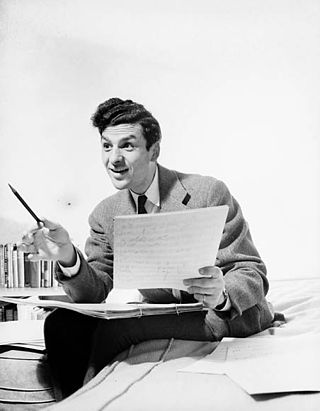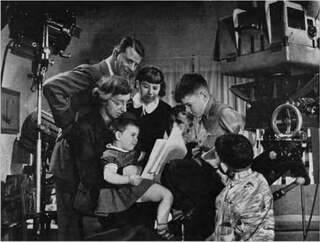
Liona Maria Carolynne Boyd, is a Canadian classical guitarist often referred to as the 'First Lady of the Guitar'.

Louis Applebaum was a Canadian film score composer, administrator, and conductor.

Frank Radford "Budge" Crawley, was a Canadian film producer, cinematographer and director. Along with his wife Judith Crawley, he co-founded the production company Crawley Films in 1939.
Michael Jones was a Canadian film director and screenwriter based in Newfoundland. He is known for his films which depicted the island's culture and humour.
Take One was a Canadian magazine devoted to coverage of both Canadian and international film.

Donald Everett Shebib was a Canadian film and television director. Shebib was a central figure in the development of English Canadian cinema who made several short documentaries for the National Film Board of Canada and CBC Television in the 1960s before turning to feature films, beginning with the influential Goin' Down the Road (1970) and what many call his masterpiece, Between Friends (1973). He soon became frustrated by the bureaucratic process of film funding in Canada and chronic problems with distribution as well as a string of box office disappointments. After Heartaches (1981), he made fewer films for theatrical release and worked more in television.
Terry Copp is a Canadian military historian and Professor Emeritus at Wilfrid Laurier University and is co-founder and Director of the Laurier Centre for Military and Strategic Disarmament Studies since the late 1980s.
Ronald Sanders is a Canadian film editor and television producer.
La Région Centrale is a 1971 experimental Canadian film directed by Michael Snow. The film is 180 minutes long and shot over a period of 24 hours using a robotic arm, and consists entirely of preprogrammed movements.

Peter Mettler is a Swiss-Canadian film director and cinematographer. He is best known for his unique, intuitive approach to documentary, evinced by such films as Picture of Light (1994), Gambling, Gods and LSD (2002), and The End of Time (2012). "His peripatetic lens is ever gravitating toward outsiders in search of ecstatic states", writes José Teodoro in Brick, "strange spectacles that defy straightforward documentation, and sacred places that promise some metaphysical deliverance. There are precedents for his methodologies—the films of Chris Marker and Werner Herzog come to mind—but Mettler’s gifts as an open and unobtrusive interviewer and his capacity to discover shared sensibilities between people of vastly diverse cultures and creeds feels singular."
Cinema Canada (1972–1989) is a defunct Canadian film magazine, which served as the trade journal of record for the Canadian film and television sector. The magazine had its origins in the Canadian Society of Cinematographers (CSC), which began publishing a bi-monthly newsletter under the name Canadian Cinematography in 1962. In 1967, the publication's name was changed to Cinema Canada. In 1972, the CSC approached George Csaba Koller and Phillip McPhedran of Toronto to produce a glossier format. However, this association lasted only four issues, after which McPhedran resigned for personal reasons.
Jane Marsh Beveridge was a Canadian director, producer, editor, composer, screenwriter, teacher and sculptor. She was best known as one of the pioneering filmmakers at the National Film Board of Canada (NFB).
grOnk, or GRoNK, was a Canadian literary magazine begun in 1967 by bpNichol and others (for example, David Aylward, David W. Harris, and Rah Smith. After the primary 8 series of 8 issues each were published, it was Nichol's efforts that maintained the irregular periodical, with guest editors including Nelson Ball, jwcurry, Steve McCaffery and R. Murray Schafer. An offshoot of Ganglia Press's Ganglia magazine, grOnk began with material gathered for Ganglia's sixth issue and became a monthly publication focusing on concrete poetry and "the language revolution" underway in Canada at the time, publishing a wide variety of "extralinear" writing from an international cast of contributors anchored in a context of parallel developments in Canadian literature. "GrOnk brought together British, Czech, American, Canadian, French and Austrian concrete and experimental practitioners..."
Philip Hoffman is a Canadian experimental filmmaker and a member of the faculty of York University.

Judith Rosemary (Sparks) Crawley was a Canadian film producer, cinematographer, director, and screenwriter. She and her husband Frank Radford "Budge" Crawley co-founded the production company Crawley Films in 1939.
Tanis MacDonald is a Canadian poet, professor, reviewer, and writer of creative non-fiction. She is Professor at Wilfrid Laurier University with specialities in Canadian literature, women’s literature, and the elegy. She is the author of four books of poetry and one scholarly study, the editor of a selected works, and the founder of the Elegy Roadshow.
The Toronto New Wave refers to a loose-knit group of filmmakers from Toronto who came of age during the 1980s and early 1990s.
The Centre for Experimental Art and Communication (CEAC) was a Canadian artist-run centre that developed out of the Kensington Arts Association (KAA) [1973-1978] in 1976 as a multimedia space that provided an important venue for experimental and avant-garde art in Toronto, Ontario and beyond. CEAC was the first ever multi-media centre owned and operated by an artist-run centre in Toronto and the largest non-institutional art space during its time. The centre engaged with artists, musicians, and activists from across North America through organized exhibitions, in addition to hosting video production facilities, workshops, screening, and performance series'. CEAC encouraged artist-to-artist communication and provided a platform for Canadian artists to expand their knowledge through international tours. The centre was also home to the radical art magazine Art Communication Edition, later renamed STRIKE. Despite its success as an artist-run centre from 1976 through to 1978, CEAC was disbanded in the summer of 1978 following scandal and the withdrawal of government funding from the Ontario Arts Council
Brenda Longfellow is a Canadian filmmaker known for her biographies of female historic figures. Since 2007, Longfellow's focus in her films has been on environmental issues.





